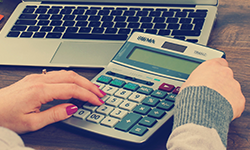
You've probably heard it a million times, create a budget and stick to it. Creating and maintaining a budget is one of the best ways for you to stay on track with your financial goals. However, your budget should be flexible enough that you can adjust it based on changes in your life and the overall economic landscape. With inflation on the rise, your current budget may no longer be realistic. To help you stay financially secure during periods of inflation, crunch the numbers, reevaluate your budget, and make some adjustments. We're sharing some tips to get you started.
1. Track your spending
To have a good idea of how you should adjust your household budget, actively track your spending to see where your money is going. Calculate your total monthly income after taxes and categorize and track your expenditures — mortgage/rent, utilities, food, transportation, clothing, entertainment, etc. Doing this will allow you to create a more accurate picture of how well your budget stacks up to how much you spend each month. This is particularly important during periods of high inflation. Why? Higher prices of gas and groceries may mean you need to cut back on expenses elsewhere. Being able to look at how much you're spending in each category will help you determine the best way to rearrange your budget to accommodate for the rise in prices.
2. Look up inflation rates by category
Typically when you see inflation discussed, it is done so in the broad sense — in terms of the overall amount that goods and services are rising in price. While this number is useful, it isn't always meaningful in relation to your personal finances. That's because inflation usually varies across different categories.
What matters for your personal finances is the inflation rate of what you spend money on. For example, if you have children who are going into college or if you're paying for your own college education, the inflation rate of higher education affects you. But, if you don't have children who are going to college or you aren't attending university, the rising cost of attending college doesn't factor into your personal finances.
There are, however, spending categories that are universal to everyone. The rising cost of food will impact your budget regardless of your personal situation. It's also important to be aware that some inflation can also create a ripple effect, regardless of your direct use of the product or category. For example, you may not have a vehicle, but the increasing price of gas will cause other price increases because of higher transportation costs.
3. Evaluate your needs vs. wants
If inflation is putting a strain on your wallet, evaluate your spending so you can determine which expenses can be considered a need versus a want. For example, while you need clothing and can't remove it from your budget entirely, you can evaluate whether a clothing purchase is out of a practical need or whether it's a fashion statement.
A good method to help you allocate spending towards needs and wants is the 50/30/20 budget. The 50/30/20 budget recommends that you spend 50% of your income on needs, 30% on wants, and 20% on savings. The 50/30/20 budget is a good starting point for most people, but it's not set in stone. If you find that the 50/30/20 budget doesn't align with your needs, change up the percentages to better match your financial goals. For instance a 30/10/60 budget skimps on wants, but will help you get out of debt quickly. If you live somewhere with high housing costs, you might find that a 60/20/20 budget works better for your financial needs.
Steps to Help You Prepare for Inflation
While inflation is unavoidable, the degree of impact it has on your financial goals depends on how you prepare for it. Here's a few steps you can take to help reduce the impact inflation can have on your finances:
- Find ways to reduce large expenses. While it's important to keep tabs on all your spending, including little purchases like your daily coffee or bagel, small expenses like your morning latte probably aren't the things making the biggest impact on your budget. While cutting back on small expenses will help, to make a bigger impact, find ways you can reduce large expenses like:
- Housing: Finding a cheaper apartment, acquiring roommates, and/or reducing utility usage can help ease your financial burden during times of inflation.
- Food: Think about where most of your meals are coming from. How often do you go out to eat? Do you buy name-brand products when you go grocery shopping? It's wise to plan your shopping list ahead of time to help keep you on track and avoid impulse buys. Also, if you aren't already, consider cutting back on costs by shopping at more affordable stores, buying store-brand products over name-brand, and eating out less.
- Transportation: Going car-free and using a bike or public transportation to get around is a good cost saving idea in theory, but may not be realistic to your daily life, depending on where you live or how busy your schedule is. Instead, try shopping around for cheaper vehicle insurance or refinance your auto loan. Depending on your situation, it may also make sense to make the switch to a hybrid or electric vehicle to reduce fuel costs.
- Housing: Finding a cheaper apartment, acquiring roommates, and/or reducing utility usage can help ease your financial burden during times of inflation.
- Refinance, consolidate, or transfer debts. While the Federal Reserve has increased interest rates, they are still low and may be lower than your current interest rate on your home or automobile. You can quickly shave several hundreds of dollars off your monthly expenses by refinancing your mortgage or auto loan with a lower interest loans. If you have several high-interest debts, consider transferring your balances to a low-interest credit card or consolidating your debts into one loan. If you have any questions about what course of action is right for you, our team of financial representatives at Members First Credit Union of Florida is here to help. Call us at (850) 434-2211 and select option 2, or stop by a branch to see how much you can save when you refinance your loan, consolidate your debt, or complete a balance transfer. You can also do the math yourself with our financial calculators.
- Consider buying in bulk. Buying items in bulk is a good way to save on items you're going to use up eventually. Toilet paper, paper towels, dish soap, laundry detergent, shampoo, etc. While it may not seem like you're saving much, if you add up the potential savings of buying these items in bulk, the amount saved usually ends up being higher than you expect.
- Purchase reusable and well-made goods. Not only is buying reusable and well-made products better for the environment, it's also typically better for your wallet too. While these products may cost more initially, the payoff is that you don't have to replace them as often.
- Suspend subscriptions. From delivery services to streaming services, according to the Washington Post, it's not uncommon for Americans to be signed up for 10 or more subscription services. With costs on the rise, removing one or two of your subscription services can help you quickly make up the difference for increased electricity costs each month or your grocery budget.
- Find ways to take in additional income. Sometimes budgeting isn't enough. So, it's important to be on the look out for ways you can earn additional income. Have a garage sale on stuff you aren't using anymore; take on a part-time job; or if you're crafty, consider opening an online store to profit from your hobbies.
RESOURCES
Rates, terms, and conditions are subject to change and may vary based on credit worthiness, qualifications, collateral age, and conditions. The APR will be disclosed prior to an advance being made on a loan.
« Return to "Blog"










